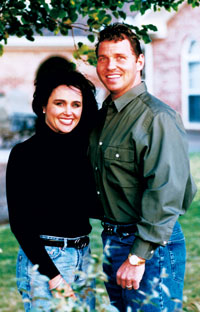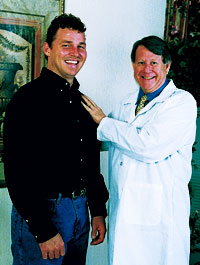
Center for Videoscopic & Laser Surgery
J. Barry McKernan, M.D., Ph.D., F.A.C.S.
2001 Professional Pkwy.
Suite 110
Woodstock, GA 30188
Toll-Free
1800-701-7470
Phone
(770) 924-8808
Fax
(770) 924-8266
Center for Videoscopic & Laser Surgery
PATIENT TESTIMONIAL
Advanced
Surgical Solutions Restore Quality of Life
Chris Frix cruises through life at 100 miles
per hour. At 34, he has a clear vision
of his goals in life and the talent and tenacity to go after them. A
successful builder-developer in Calhoun, Georgia, he is a self-assured
"landjockey" who wheels and deals in property. He's built
a wonderful life for himself and his family, including wife Rhonda and
two children. The Frixes even have a 100,000-acre deer ranch in south
Texas, where they host hunting excursions four months a year.
BY EILEEN FREEMAN
 Outdoorsman,
family man and entrepreneur, Chris Frix has the brass ring of life firmly
in hand. But six years ago, life threw him a monkey wrench. He was stricken
with severe acid reflux.
Outdoorsman,
family man and entrepreneur, Chris Frix has the brass ring of life firmly
in hand. But six years ago, life threw him a monkey wrench. He was stricken
with severe acid reflux.
Like most people, he mistakenly assumed it would go away. And he did not seek immediate medical attention. For almost three years, Chris tried to manage his own illness, avoiding his favorite foods and adjusting his sleeping positions. Lying flat on his back caused such horrific reflux episodes that he would wake up choking.
His family doctor prescribed several medications, including the popular drug Prilosec, which eased his symptoms but did nothing to solve his problems.
RIGHT: For GERD patient Chris Frix and his wife Rhonda, quality of life is what it’s all about. Pictured on their 400-acre farm near Calhoun, the Frixes raise pigmy goats, pot-bellied pigs, turkeys, geese, chickens and a small herd of buffalo in a sanctuary for their two boys to enjoy.
Chris realized that he wasn’t controlling his reflux disease – it was controlling him. He was losing the very thing he had worked so hard for – quality of life.
One night when Chris was working late in his home office, he experienced such excruciating pain that he thought he was having a heart attack. His wife rushed him to the hospital. It wasn’t a heart attack. Chris was diagnosed with a severe hiatal hernia. His only two options: surgery or more suffering.
Chris and Rhonda slowly absorbed the reality of what seemed to be a no-win situation. They wrongly assumed that surgery would pose uncomfortable risks and put Chris out-of-action for at least a month, which could prove disastrous in his business. Yet, without surgery, he would continue to suffer the debilitating episodes of reflux daily. Plus, the doctors informed him about the degenerative effects of the disease, which could lead to further damage, including cancer.
Rhonda Frix made it her mission to find the best doctor available. Her efforts led to Dr. Barry McKernan who was described to her as a world-class surgeon specializing in reflux disease. A few days later Chris met with Dr. McKernan and was convinced to proceed with surgery and as he described it “signed on the dotted line.”
 Prior
to surgery, Dr. McKernan performed a diagnostic procedure called gastroscopy
(EGD) on Chris so he could visually examine the hiatal hernia. He determined
that fundoplication, a minimally-invasive endoscopic procedure, was
the appropriate surgical approach. Chris arrived for his surgery at
7:30 AM. One hour later, he was in recovery.
Prior
to surgery, Dr. McKernan performed a diagnostic procedure called gastroscopy
(EGD) on Chris so he could visually examine the hiatal hernia. He determined
that fundoplication, a minimally-invasive endoscopic procedure, was
the appropriate surgical approach. Chris arrived for his surgery at
7:30 AM. One hour later, he was in recovery.
RIGHT: In his post-op visit with Dr. McKernan, patient Chris Frix received a clean bill of health.
In less than 24 hours, Chris was released.
He went home, took a shower and, against doctors’ orders, went
into the office. Chris insists that he felt fine. He followed his prescribed
liquid diet and, a few days after surgery, savored his first bite of
grilled salmon.
“I had built up subconscious defenses against ordering foods that
I knew would cause the reflux episodes to be worse,” he says. “It
took me a while after surgery to simply relax and feel safe to order
and enjoy the foods I like.
“I can’t believe how difficult
my life was during those years,” he reflects. “Not only was
I suffering painful episodes of reflux on a daily basis, but I tried
to avoid eating meals with customers and colleagues because of the embarrassment
of my reflux episodes. I rarely got a decent night’s sleep. I could
only get to sleep on my left side or in a recliner.”
Today, Chris Frix says that he is grateful to have regained his quality
of life – thanks to the advanced medical treatment he received
from Dr. McKernan.
REVOLUTIONARY
SOLUTIONS
No one needs to tolerate reflux disease anymore, explained Dr. McKernan,
who has been at the forefront of research, development and practice
of the treatments and cures for gastroesophageal reflux disease (GERD),
with documented success in treating hundreds of patients in the past
year alone.
A dozen years ago, a person suffering from severe GERD caused by a hiatal hernia or related defect had two choices: Live with it or go under the knife in a high-risk open surgery with a lengthy recovery period. This surgical approach was so invasive that patients with moderate acid reflux frequently opted to forego surgery and find a way to manage their disease.
While there is still no medicinal cure for GERD, fundoplication can put a patient back on their feet in a matter of days. And that’s important news for the nearly one-third of all adults likely to develop some degree of reflux disease.
Performing fundoplication in an outpatient surgery center, Dr. McKernan has produced a cure for acid reflux disease in over 90% of his cases, without a single conversion to open surgery.
STRETTA™
BREAKTHROUGH
For qualifying patients with mild GERD, there’s a new non-surgical
treatment for chronic heartburn called StrettaTM (Italian for shrinkage
or tightening).
In this minimally-invasive outpatient procedure, controlled radiofrequency energy is delivered through an endoscope to the muscle joining the esophagus and stomach to create thermal lesions. As the lesions heal, the barrier function of this sphincter muscle improves, thus reducing the occurrence of reflux. Patients are able to resume normal activities the very next day.
From the Summer 2002 issue of Season Magazine.
